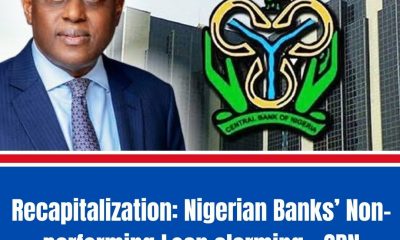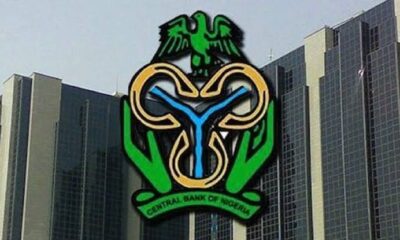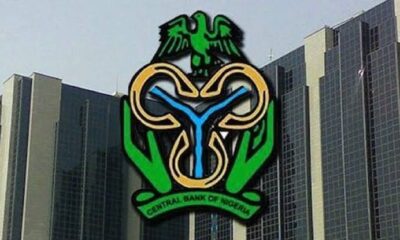Business
Cardoso mentions ‘new sources’ of Nigeria’s inflation, urges fiscal authorities to act

The Governor of the Central Bank of Nigeria (CBN) Olayemi Cardoso, has called on the fiscal authorities to address new sources of inflation to complement the efforts of monetary policy in achieving price stability.
In his statement published after the last Monetary Policy Committee (MPC) meeting held on 26 and 27 February, Mr Cardoso highlighted the need for collaborative efforts between monetary and fiscal authorities to address the multifaceted nature of inflationary pressures in the Nigerian economy.
He expressed worry over the persistence of inflationary pressures despite efforts to stabilise the foreign exchange market since its previous meeting where the rate was increased by 400 basis points to 22.75 per cent.
The CBN helmsman spoke on the risk of escalating inflation and highlighted the need for decisive action to prevent hyperinflationary pressure.
Although monetary factors contributing to inflation are diminishing, structural issues such as increases in food and energy prices continue to drive inflation, he explained.
He also said there are new sources of inflation, including ‘seller inflation’ and government purchases for distribution as palliatives.
READ ALSO: Tension at CBN as Cardoso sacks eight directors who worked with Emefiele
“In addition, huge purchases by the government for distribution as palliatives to vulnerable citizenry is adding another dimension to the food price inflation, with seasonal factors of food price increases during religious fasting and festive periods, adding price cyclicality.
“Some of these new sources of inflation are better addressed by the fiscal authorities to complement the efforts of monetary policy in achieving round price stability,” he said.
Similarly, Emem Usoro, a member of the MPC, urged fiscal authorities to collaborate closely with monetary policymakers to address inflationary pressures.
This includes implementing measures to tackle structural factors contributing to inflation, such as addressing issues in commodity markets and managing price fluctuations during religious and festive periods.
Additionally, fiscal policies should aim to complement monetary efforts in anchoring inflation expectations and promoting overall price stability in the economy, the expert noted.
“From the foregoing, it is obvious that the continuous rise in inflation is detrimental to the broad recovery of the economy,” the MPC member argued.
“While the rise can be attributed to both monetary and structural factors, unwavering collaboration between the monetary and fiscal authorities is essential to effectively combat upward price movement and restore macroeconomic equilibrium.
“Monetary policy must thus focus on two key issues: moderating monetary demand and stabilizing the exchange rate.”
In March 2024, Nigeria witnessed a surge in food inflation, with the rate reaching 40.01 per cent, reflecting a significant increase of 15.56 percentage points compared to March 2023 when it stood at 24.45 per cent.
According to the data released by the National Bureau of Statistics, this upward trend was attributed to the escalating prices of staple items such as garri, millet, and akpu (all categorized under Bread and Cereals), as well as yam tuber, water yam, and other essential food commodities.
Simultaneously, the country’s overall inflation rate rose to 33.2 per cent in the same month, reflecting a 1.5 percentage point increase from the 31.7 per cent recorded in February.
The March inflation was primarily driven by notable increases in food and beverage costs, in addition to rising energy and housing expenses.
-

 News7 days ago
News7 days agoDrama As NDLEA Issues 7 Days Ultimatum To Bayelsa Community Over Stolen Pistol.
-

 Business7 days ago
Business7 days agoCBN Governor, Deputies Acquire N10 Billion Bulletproof SUVs, Increase Allowances
-

 Business5 days ago
Business5 days agoAGAIN: Yakubu Teri, CEO Of Kwakol Markets Ltd, In Customer Funds Misappropriation Scandal
-

 Politics5 days ago
Politics5 days agoEkiti 2026: Oni withdraws from partisan politics, endorses Oyebanji’s re-election
-

 Business3 days ago
Business3 days agoIn Tinubu’s First Year As President, Oando’s Market Value Jumps From N70 Billion To N1 Trillion
-

 Politics5 days ago
Politics5 days agoPDP STATE CONGRESS: Cocodia Congratulates New Executive
-

 Politics4 days ago
Politics4 days agoRivers Politics: If The NWC Recognizes Wike As The Leader Of Rivers PDP; The Congress Is A Success -Dan Ulasi
-

 Politics4 days ago
Politics4 days agoPDP, APC, Labour Party stakeholders endorse Senator Nwoko’s pursuit of Anioma state
















